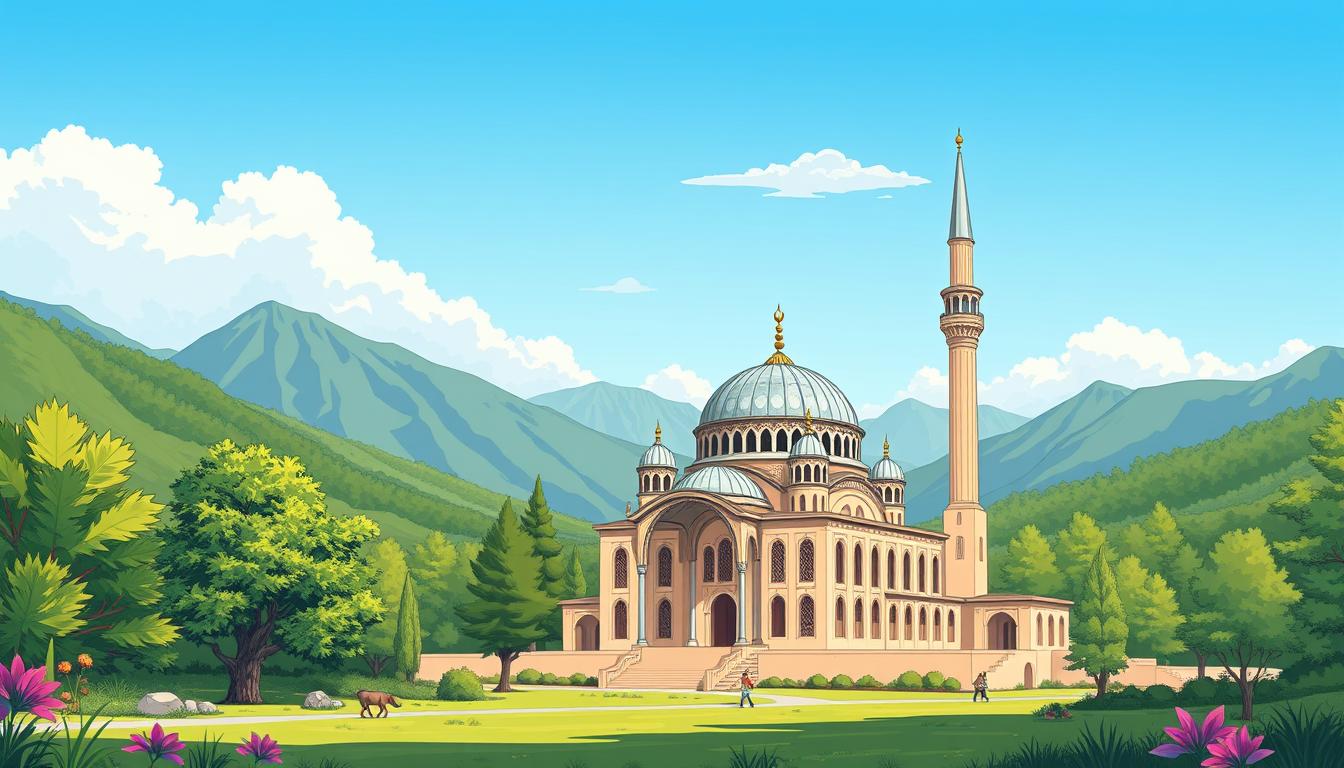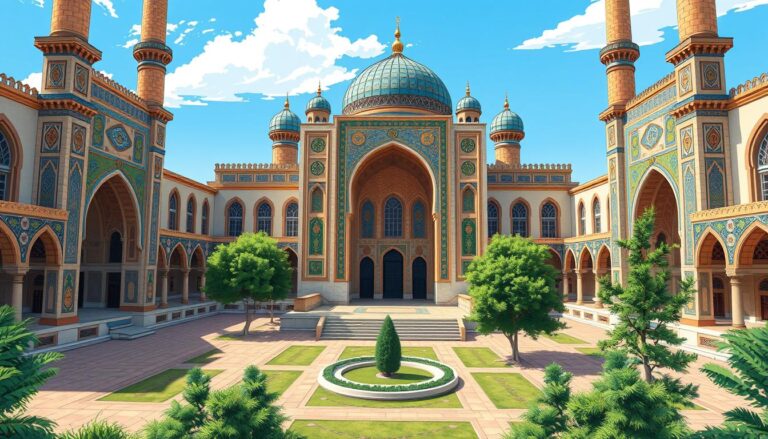Islam in Azerbaijan
Azerbaijan is a diverse nation where Islam has played a big role. It has shaped the country’s culture and religion. About 97.3% of the people in Azerbaijan are Muslim, according to the CIA (2020). The Pew Research Center (2006) says it’s even more, at 99.2%.
The majority, 55-65%, are Shia Muslims. A smaller group, 35-45%, are Sunni Muslims. Traditionally, the differences between Shia and Sunni Islam are not big in Azerbaijan. This is because the country has a long history of Islamic influences and Muslim culture.
In Azerbaijan, Shia Islam is common in the west, center, and south. Sunni Islam is more common in the north. This shows how Islamic practices and mosques have spread across the country.
Historical Roots of Islam in Azerbaijan
The Islamic history of Azerbaijan began in the 7th century with the Arabs’ arrival. At first, Islam slowly replaced Christianity and old beliefs. It became the main religion over time.
In the 16th century, the Safavid Dynasty changed Azerbaijan’s religious scene. Shah Ismail I made Shia Islam the official faith, even though some people were Sunni. This was a key moment for Shia Islam in Azerbaijan.
“The classical Arabic and Persian geographers separated Azerbaijan administratively into eastern and western divisions, with Marāḡa being the center of the eastern part and Ardabīl as the capital of the western division.”
Before the Safavid era, Azerbaijan was diverse. It had Zoroastrian fire temples and many Christians. But, the Arab conquest and Islam’s rise changed everything.
Islam kept growing in Azerbaijan until the 10th century. Mosques and madrasas helped make Islam stronger in the area.
Safavid Dynasty and Establishment of Shia Islam
The Safavid Dynasty was key in changing Azerbaijan’s religious scene. Starting in the early 16th century, they made Shia Islam the main religion. This move changed the balance from Sunni Islam and created a deep Sunni-Shia divide.
During the Safavid rule, Shia Islam in Azerbaijan grew strong. The dynasty worked hard to spread and enforce Shia beliefs. This was a smart move to show their power and stand out from the Sunni Ottoman Empire. But, it also led to fights and trouble in the area.
“The Safavid dynasty’s establishment of Shia Islam as the state religion brought contention between the Safavid rulers and the ruling Sunnis of the neighboring Ottoman Empire.”
The Safavid era had a big impact on Azerbaijan. It shaped the country’s faith and culture for many years. The Safavid Dynasty and its role in the Shia-Sunni divide still affect the region’s religious life today.
Sunni and Shia Divide
In Azerbaijan, the Sunni-Shia divide has left a lasting impact. Over time, the Sunni-Shia divide in Azerbaijan has evolved. This has changed the regional distribution of Sunni and Shia Muslims in the country.
Regional Distribution of Sunni and Shia Muslims
The Sunni-Shia divide in Azerbaijan was influenced by politics and society. In the 19th century, many Sunni Muslims left due to wars with the Ottoman Empire. By the late 19th century, Shias became the majority in Russian Azerbaijan.
But, by the late 19th century, nationalism united both Sunnis and Shias. They shared a Turkic heritage and opposed Iranian religious influence. Today, Shias make up about 65% of the population, while Sunnis are 35%.
“The Safavid dynasty in Persia established Shia Islam as the state religion in 1501, marking a significant shift in the dominance of Sunni Islam.”
The Sunni-Shia divide in Azerbaijan was also shaped by the Safavid dynasty in the 16th century. They made Shia Islam the state religion in Persia. This change has influenced Azerbaijan’s religious demographics ever since.
Despite past tensions, the Sunni-Shia divide in Azerbaijan has lessened in recent years. There’s more focus on shared Turkic identity and less on external religious influences. Yet, the regional distribution of Sunni and Shia Muslims still plays a role in Azerbaijan’s religious demographics.
Islam under Russian Empire and Soviet Union
The history of Islam in Azerbaijan was shaped by its time under the Russian Empire and the Soviet Union. In 1806, Azerbaijan fell under Russian rule. Before the Soviet era, there were about 2,000 active mosques. But, most were shut down in the 1930s, with only a few reopening during World War II.
The Soviet regime pushed for an Azerbaijani national identity, often against Islamic ties. Islam in Azerbaijan faced harsh suppression and secularization under Soviet rule. The government aimed to reduce religion’s influence and promote communism instead.
- During the Soviet era, around 90% of Muslims in the USSR followed Sunni Islam, while 10% were Shia.
- Six Soviet Union republics had Muslim-majority populations, including Azerbaijan.
- In 1989, as the Soviet Union was ending, many mosques were reopened, and new Muslim groups formed.
- Estimates show that between 45 and 50 million Soviet citizens identified as Muslims before the Soviet Union dissolved.
The secularization of Islam in Azerbaijan under the Russian Empire and the Soviet Union had a lasting impact. While more mosques and believers have emerged since the Soviet era ended, the legacy of state-sponsored secularization still influences Islam’s role in Azerbaijani society.
“The Soviet rule promoted an Azerbaijani national consciousness as a substitute for identification with the world.”
The complex history of Islam in Azerbaijan under the Russian Empire and the Soviet Union has deeply influenced the country’s religious and cultural identity. As Azerbaijan moves forward from the Soviet era, finding a balance between secularism and religious expression remains a significant challenge.
Islam in Azerbaijan
Nominal Adherence and Secularism
After the Soviet Union fell, most people in Azerbaijan still say they are Muslim. But, the country is mostly secular. Only a small part of people’s lives is influenced by religion.
It’s said that 55-65% of Azerbaijanis are Shia Muslims, and 35-45% are Sunni. But, the government doesn’t stress these differences much. This shows how nominal adherence to Islam in Azerbaijan is shaped by Soviet secularism.
Even though many people call themselves Muslim, secularism in Azerbaijan is clear. Only 4% to 6% are truly active in their faith. The rest identify as Muslim but don’t follow all religious rules. This shows how Islam in modern Azerbaijan is not as important as it used to be.
“Azerbaijani nationalism is rooted in Turkism, modernization, and Islam, with a debate ongoing regarding the interpretation of Turkism.”
Constitutional and Legal Framework
Azerbaijan’s constitution supports secularism, keeping religion and state separate. The law ensures everyone has the right to practice their faith freely. It also protects the right to express religious beliefs and perform rituals, as long as they don’t harm public order or morals.
The government can’t get involved in religious matters. Both the state and citizens must fight against “religious extremism” and “radicalism.” This setup helps keep Azerbaijan’s secular constitution and legal framework strong.
“The Republic of Azerbaijan is a secular state. Religion is separated from the state.”
– Article 7, Constitution of the Republic of Azerbaijan
Also, religious groups must register with the State Committee on Religious Associations of the Republic of Azerbaijan (SCWRA). To register, they need a notarized application signed by at least 50 members. They also have to provide their charter and founding documents.
The SCWRA reviews the application and decides within 30 days. There’s a chance to appeal if needed. For Muslim groups, they also need approval from the Caucasian Muslim Board (CMB).
Government Oversight and Restrictions
The government of Azerbaijan tightly controls religious activities. In March, new laws changed who picks religious leaders in mosques. Now, the State Committee on Religious Associations of the Republic of Azerbaijan (SCWRA) makes these decisions, not the Caucasian Muslim Board (CMB).
This change shows the government’s growing control over religious leaders. It also shows how the government wants to keep a close eye on religion in the country.
The government also has a say in who leads religious groups that aren’t Islamic. This shows how the government limits religious freedom. It wants to keep a tight grip on the religious scene.
Appointment of Religious Personnel
The government now decides who leads mosques in Azerbaijan. The new laws give the SCWRA this power, reducing the CMB’s role. This change shows the government’s push for more control over religious leaders.
“The government’s ability to appoint and dismiss religious leaders is a concerning development, as it undermines the independence of religious institutions and can lead to the suppression of diverse religious expression.”
The government’s control over religion in Azerbaijan is a big issue. It shows the struggle between the state’s control and the right to freedom of religion or belief.
Minority Religious Groups
Azerbaijan is a Muslim-majority country with a rich mix of religious minorities. Islam is the main faith, with over 96% of the population. Yet, other religions also thrive here.
Christianity is found in various forms, including Orthodoxy, Catholicism, and Protestantism. It’s estimated that 280,000–450,000 people (3.1%–4.8%) follow Christianity. The Baha’i Faith also has a presence, with about 2,000 followers, mostly converts. Other faiths include the Russian and Georgian Orthodox Churches and several Christian denominations.
The Jewish community has been in Azerbaijan for over 2,000 years. There are seven Jewish communities officially recognized by the state. The government supports the rebuilding of places of worship for different religions, like synagogues and churches.
- Azerbaijan is a secular state where all religions are equal before the law.
- The Muslim-majority country has a solid record of tolerance towards religious minorities.
- Religious minorities in Azerbaijan, including Christians, Jews, and Baha’is, enjoy freedom of religion and are not discriminated against by the authorities.
Azerbaijan shows strong support for inter-religious solidarity. Different religious groups often help each other, fostering understanding and cooperation.
“Azerbaijan is described as a multi-national and multi-religious country with a policy based on co-existence and tolerance of various ethnic groups and religious minorities.”
Human Rights Concerns
Azerbaijan’s human rights record has faced criticism. There are reports of religious freedom violations, persecution of religious minorities, and arrests of religious activists. Local groups and organizations have spoken out about the government’s treatment of religious people.
They point to physical abuse, temporary detention, and imprisonment of religious leaders. Human rights NGOs say many arrests, even for drug charges, are politically motivated. This targets those who practice their faith outside approved institutions.
The European Court of Human Rights (ECHR) has ruled against Azerbaijan in several cases. These include arrests of Jehovah’s Witnesses meeting in a private home. This shows the government’s strict control over religious activities and expression.
By the end of the reporting year, 22 individuals remained imprisoned for their religious beliefs or practices. This highlights the government’s efforts to control religious activities. It raises serious concerns about religious freedom and human rights in Azerbaijan.
“The government’s actions against religious activists and minority groups demonstrate a concerning disregard for fundamental human rights and religious freedoms in the country.”
Conclusion
Azerbaijan’s religious scene is complex, influenced by history, politics, and identity. It is mostly Muslim, with Shia Islam being the main faith and Sunni Islam a smaller but significant part.
The government tries to control religious messages and push for “Traditional Islam.” This has shaped the country’s religious landscape. Despite being the most secular Muslim country in former Soviet areas, Islam’s rise has brought new challenges.
Yet, Azerbaijan stands out as a progressive and secular Islamic society. It has a history of embracing Western ways and norms. The mix of secular thinkers and religious leaders has made Azerbaijan’s Islamic journey unique. It offers a compelling look at how religion and politics interact in the post-Soviet world.
Source Links
- Islam in Azerbaijan
- Religion in Azerbaijan
- Welcome to Encyclopaedia Iranica
- Islam in Azerbaijan – Baku International Multiculturalism Centre
- Safavid dynasty | History, Culture, Religion, & Facts
- Safavid dynasty
- The Sunni-Shia Divide
- Sunni-Shia Issue in Azerbaijan
- Islam in the Soviet Union
- Islam in Post-Soviet Azerbaijan
- No title found
- Islam in Post-Soviet Azerbaijan
- Religion in Azerbaijan
- "Islam does not have a significant influence on society in Azerbaijan. What does this mean?" Study
- Azerbaijan – United States Department of State
- Azerbaijan – United States Department of State
- 2023 USCIRF Annual Report
- Azerbaijan – United States Department of State
- Religion
- National Profiles | World Religion
- Azerbaijan – United States Department of State
- 2021 Country Reports on Human Rights Practices: Azerbaijan
- U.S. Puts Azerbaijan On Religious Freedom Watch List
- Traditional Islam in Azerbaijan: Countering Fundamentalism and Consolidating Authoritarianism – PONARS Eurasia
- Islamic Revival in Azerbaijan
- Microsoft Word – 0607Azer.doc







